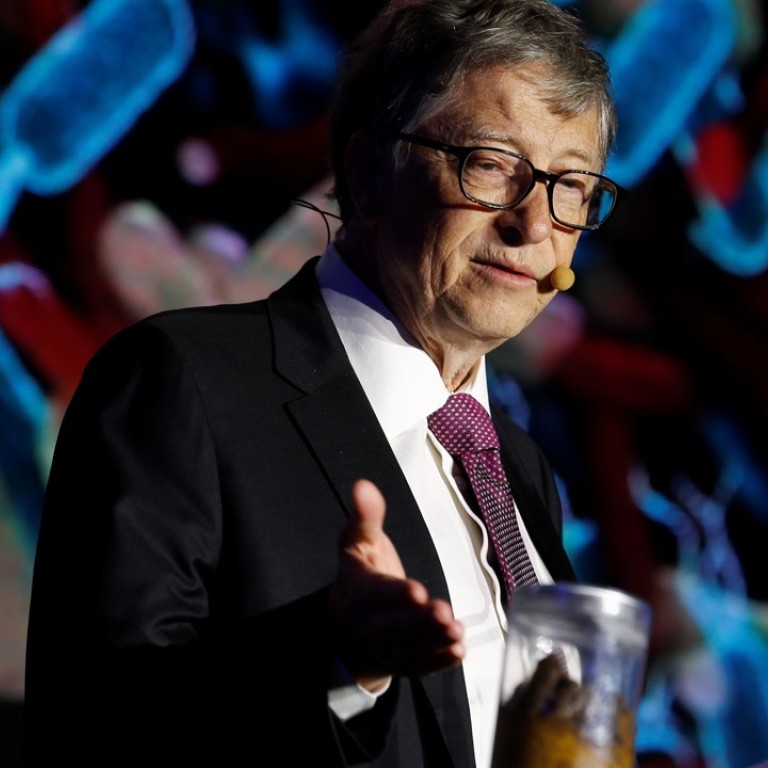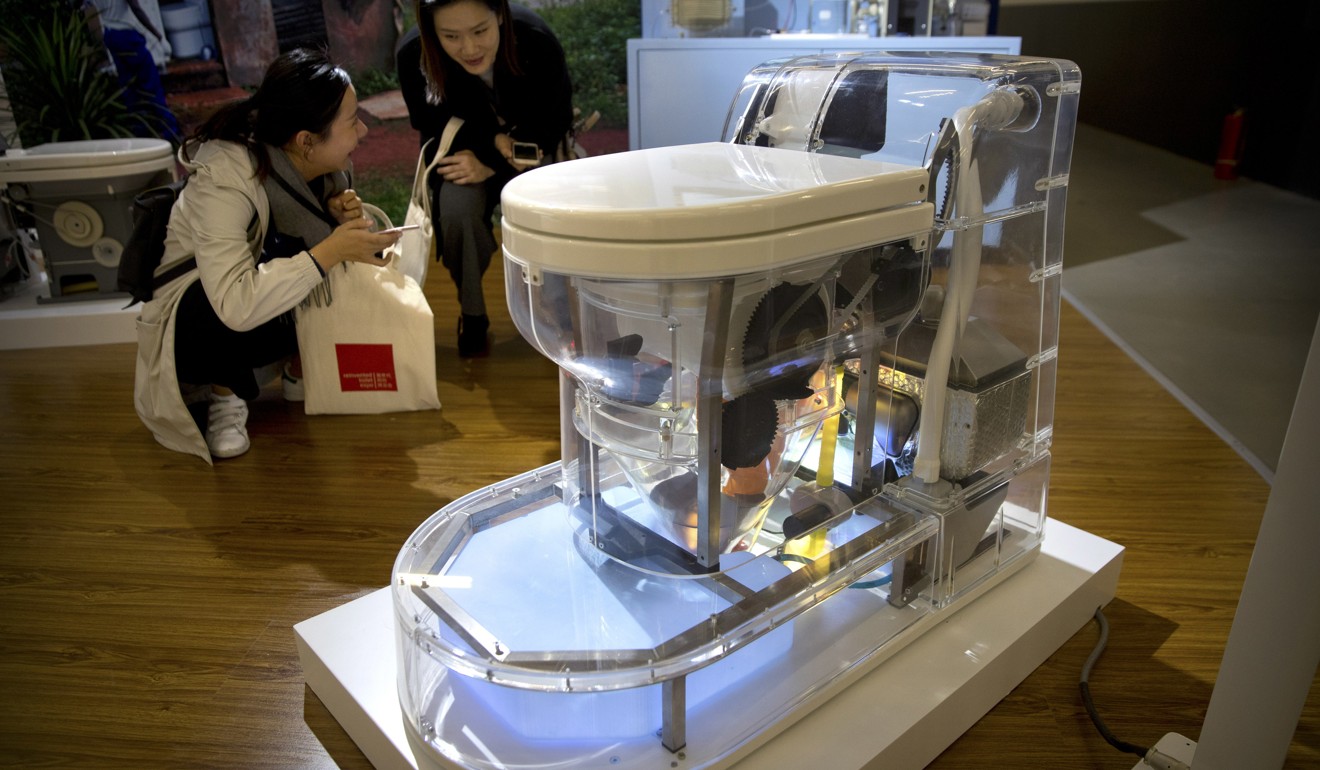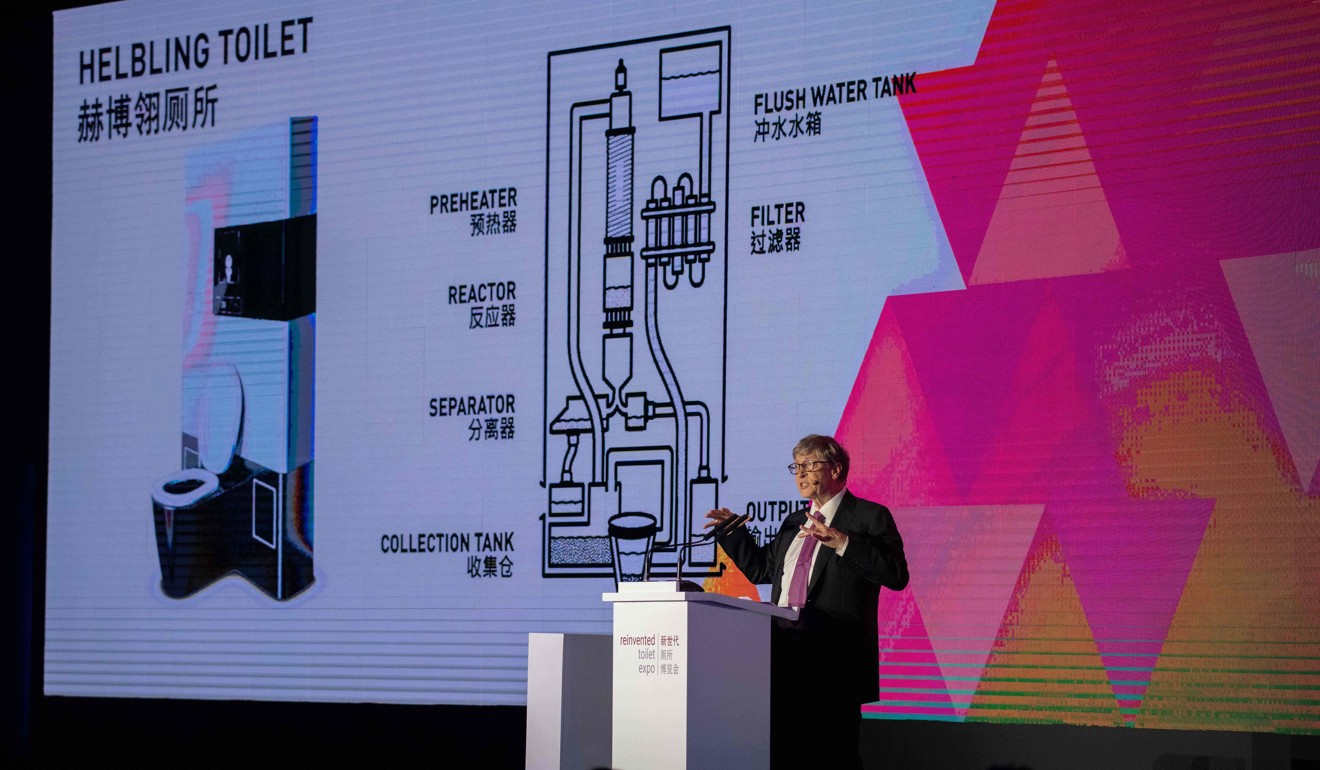
Bill Gates uses jar of poop to draw attention to the world’s toilet problem at China expo
- Billionaire philanthropist tells event in Beijing about charity’s work to bring down cost of providing safe sanitation in developing countries
- He says technologies on show at three-day event are ‘most significant advances in nearly 200 years’
Billionaire philanthropist Bill Gates wants the world to take notice of a serious issue that affects nearly half of the population – sanitation.
The Microsoft founder has been investing in finding solutions to the problem for the past seven years. Opening the three-day Reinvented Toilet Expo in Beijing on Tuesday, he said his charity had already spent US$200 million on research and development into sanitation technology to bring down the cost of providing clean and safe facilities in developing countries, especially areas without sewers. And it plans to spend another US$200 million.
“We are all here for one reason: because more than half the world’s population doesn’t have the safe sanitation they need to lead healthy and productive lives,” Gates told officials, business owners, bankers and academics at the expo hosted by the Bill & Melinda Gates Foundation.
I have to say, a decade ago I never imagined that I’d know so much about poop
To make his point, Gates brought on stage a jar of human waste, saying the pathogens it contained could cause diarrhoea, cholera and typhoid – illnesses that kill nearly 500,000 children aged under five every year in places without proper sanitation.
He said he became aware of the problem when he began travelling to poor areas with his wife Melinda Gates and found children playing in lanes strewn with human waste and where the water was contaminated.
They recognised the need to provide sanitation as a step to reducing poverty.
“One of the things we’re able to do as a foundation is invest in the early-stage R&D needed to create a path forward for the private sector to commercialise technologies and products that also help us achieve our goals. It’s a real win-win,” Gates said.
He said the foundation’s partners had developed a self-powered technology that takes in human waste, kills dangerous pathogens and converts the resulting materials into products with potential commercial value – like clean water, electricity and fertiliser.
China’s toilet revolution: why you no longer have to fear its dirty squat toilets
“I have to say, a decade ago I never imagined that I’d know so much about poop. And I definitely never thought that Melinda would have to tell me to stop talking about toilets and faecal sludge at the dinner table,” the billionaire told a laughing audience. “But I’m quite enthusiastic about what has been accomplished in just seven years.”

Twenty of the hi-tech toilets are on show at the expo – all of them taking a different approach to break down human waste and destroy germs, leaving behind clean water or solids that can be used as fertiliser or safely disposed outdoors.
“The technologies you’ll see here are the most significant advances in sanitation in nearly 200 years,” Gates said.
Three years ago, Chinese President Xi Jinping called for improvements to toilets across the country in a campaign known as the “toilet revolution”. Since then, tens of thousands of facilities have been built or upgraded. At first the focus was on tourist sites but the campaign was later expanded nationwide to rural areas and cities.
The man building a better today for China’s children – one toilet at a time
However, there are still some 57 million households without their own toilets and, of those, 17 million – mainly in the countryside – face serious hygiene issues.
According to Gates, solving the sanitation problem in developing countries would also create a new multibillion-dollar business opportunity. He estimated that by 2030, it would be worth about US$6 billion a year worldwide.

He explained how a toilet designed by Swiss engineering firm Helbling worked, discharging some liquid but filtering most of it back into the flushing tank for reuse. Swiss fragrance company Firmenich has also developed a toilet treatment product that can eliminate odours to reduce the number of daily flushes needed for just US$1.30 a month.
In China, the foundation is working with three local partners to improve toilet facilities. One of them is Eco-San, which has developed a system that can treat human waste, and filter and recycle the flushing water.
China’s ‘toilet revolution’ is almost complete … but it’s still far behind global standards
It has been introduced in primary schools, temples and tourist spots in Yixing, Jiangsu province and has capacity for 300 to 2,500 flushes a day, costing about 15 US cents each time.
“The price will be much lower if they are mass-produced or if we can find local partners in underdeveloped areas for mass production,” deputy general manager Mary Li said.

